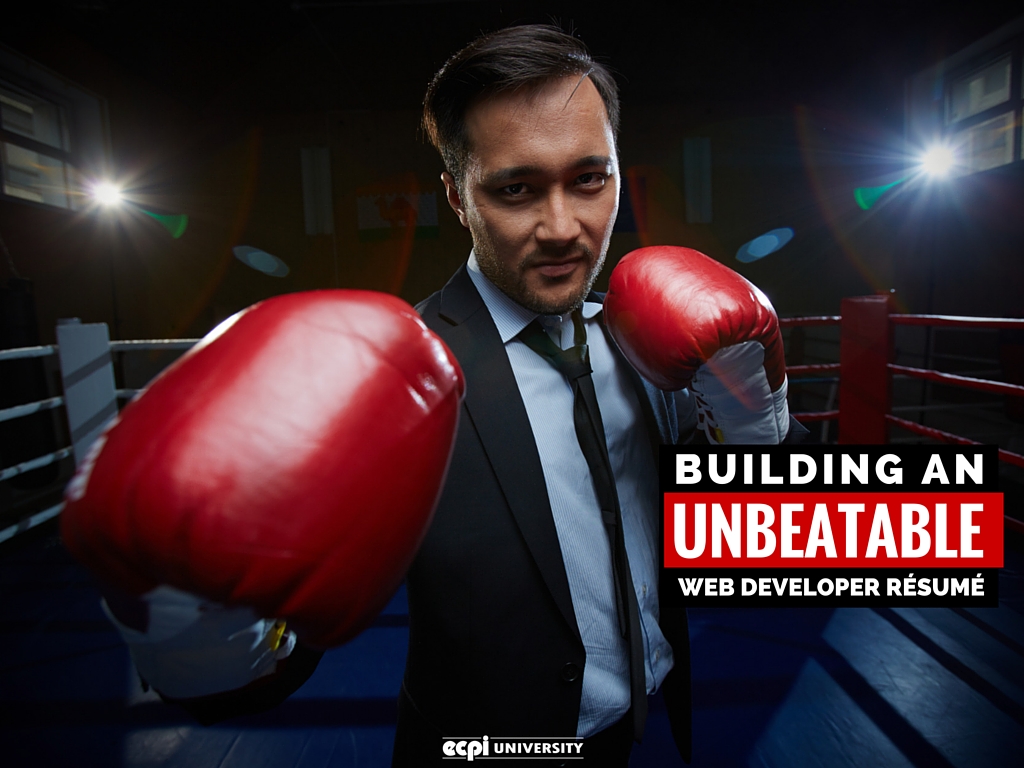 When you stop and think about it, a web developer really shouldn't need a résumé that's more than a simple list of links. After all, the web developer's work is out there on the World Wide Web for all the world to see.
When you stop and think about it, a web developer really shouldn't need a résumé that's more than a simple list of links. After all, the web developer's work is out there on the World Wide Web for all the world to see.
In theory, all a prospective employer would need to do to determine whether or not you're the right person for the job is simply click a few links, check out the site design, graphic elements, interactivity and overall functionality and then offer you the job.
In theory.
In reality, however, there is a lot more that goes into being an effective web developer than what shows up on the public-facing side of a web site. There's your ability to effectively collaborate and communicate with colleagues, your education and all of your other intangible attributes that differentiate you from the competition.
And that's why you need an unbeatable web developer résumé.
With that in mind, here's a look at some web developer résumé tips guaranteed to help you stand out from all the other web developers—in your hometown and around the world:
Introduce yourself . . . start with a strong statement
At the end of the day, there are going to be a lot of web developers that have many of the same skills. Logic and design? Check, everyone's taken the class. Database I? Check. UNIX administration, code design and programming II? Check, check, and check.
So instead of starting with a list of common courses, start with a strong statement about you, your professional values, and your most impressive accomplishments. Call it your vision statement (not literally, though—you don't have to label your statement on your résumé).
Starting with a strong statement is a great way to quickly introduce yourself to prospective employers and differentiate yourself from the competition in three or four clear, concise, well-written sentences.
Always focus on action and results
So you just graduated with a B.S. in computer and information science. You've designed and built a plethora of websites. They look good. They incorporate a lot of the concepts you've been learning in class. They function well.
Congratulations. But can your websites sell?
There are plenty of web developers who can build beautiful, fully functional websites. But those who understand how to compel users to take action are the all-stars.
That's why it's important to include analytics on your web developer résumé. Make sure the prospective employers can see statistics about how you "increased user clicks" or "boosted sales." Always focus on the action you and your websites have driven.
Remember, to prospective employers, it's always about the action.
List your skills, and quickly
It's a sad but true fact that your résumé will likely get about 25 seconds worth of time in front of the human resources professional or hiring manager before it's either put in the pile that's moving forward or put in the circular file.
One way to maximize those precious few seconds is to list your skills at the top of your résumé. Hiring managers will know exactly what skills they want their new website developer to have, and they don't want to spend a lot of time looking through a résumé to find out if you have the right skills.
So list them. Right at the top of your résumé. Label the section "Skills" and then list all of your skills—from Photoshop to HTML to CSS to Illustrator to PHP to Ruby to . . .
Proof it and proof it again
You don't have to be a professional writer to be an effective web developer, but you should be professional. And making a positive, professional impression starts with your résumé and cover letter.
In many cases, your résumé will be the very first impression you make on a prospective employer—do everything you can to make sure it's not the last impression you make.
Proofread your résumé (at least twice) to make sure it's not riddled with grammatical and spelling errors. In fact, go a step further and have a friend (one of your super-smart friends) proofread it too. Do not send out a résumé (or cover letter) that contains any spelling or grammar errors. If you do, you might not get a chance to make a second impression.
Make your education count
First things first: Your education should be the last thing you list on your résumé—and you should make it count.
Make sure you go a little further than simply listing your degree. List some of your academic achievements that support your vision statement. This can be especially valuable for new graduates who don't have a lot of professional experience.
Put Your Education First . . . at ECPI University
Of course you can't include your education until you've successfully earned your degree. If you're ready to start building your résumé, connect with ECPI University today to learn more about earning a Bachelor of Science in Computer and Information Science with a concentration in Web Development. It could be the Best Decision You Ever Make!
I want to offer students the opportunity to gain real world experience in web & mobile software development—> http://t.co/RufrzSJHaK
— Kishau Rogers (@kishau) April 15, 2014
DISCLAIMER – ECPI University makes no claim, warranty or guarantee as to actual employability or earning potential to current, past or future students or graduates of any educational program we offer. The ECPI University website is published for informational purposes only. Every effort is made to ensure the accuracy of information contained on the ECPI.edu domain; however, no warranty of accuracy is made. No contractual rights, either expressed or implied, are created by its content.
Gainful Employment Information – Web Development - Bachelor’s
For more information about ECPI University or any of our programs click here: http://www.ecpi.edu/ or http://ow.ly/Ca1ya.


